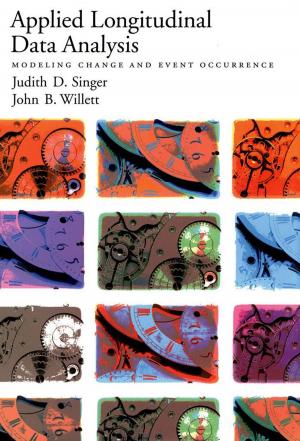The Role of Technology in Clinical Neuropsychology
Nonfiction, Health & Well Being, Psychology, Physiological Psychology, Neuropsychology| Author: | ISBN: | 9780190668976 | |
| Publisher: | Oxford University Press | Publication: | March 24, 2017 |
| Imprint: | Oxford University Press | Language: | English |
| Author: | |
| ISBN: | 9780190668976 |
| Publisher: | Oxford University Press |
| Publication: | March 24, 2017 |
| Imprint: | Oxford University Press |
| Language: | English |
Neuropsychology as a field has been slow to embrace and exploit the potential offered by technology to either make the assessment process more efficient or to develop new capabilities that augment the assessment of cognition. The Role of Technology in Clinical Neuropsychology details current efforts to use technology to enhance cognitive assessment with an emphasis on developing expanded capabilities for clinical assessment. The first sections of the book provide an overview of current approaches to computerized assessment along with newer technologies to assess behavior. The next series of chapters explores the use of novel technologies and approaches in cognitive assessment as they relate to developments in telemedicine, mobile health, and remote monitoring including developing smart environments. While still largely office-based, health care is increasingly moving out of the office with an increased emphasis on connecting patients with providers, and providers with other providers, remotely. Chapters also address the use of technology to enhance cognitive rehabilitation by implementing conceptually-based games to teach cognitive strategies and virtual environments to measure outcomes. Next, the chapters explore the use of virtual reality and scenario-based assessment to capture critical aspects of performance not assessed by traditional means and the implementation of neurobiological metrics to enhance patient assessment. Chapters also address the use of imaging to better define cognitive skills and assessment methods along with the integration of cognitive assessment with imaging to define the functioning of brain networks. The final section of the book discusses the ethical and methodological considerations needed for adopting advanced technologies for neuropsychological assessment. Authored by numerous leading figures in the field of neuropsychology, this volume emphasizes the critical role that virtual environments, neuroimaging, and data analytics will play as clinical neuropsychology moves forward in the future.
Neuropsychology as a field has been slow to embrace and exploit the potential offered by technology to either make the assessment process more efficient or to develop new capabilities that augment the assessment of cognition. The Role of Technology in Clinical Neuropsychology details current efforts to use technology to enhance cognitive assessment with an emphasis on developing expanded capabilities for clinical assessment. The first sections of the book provide an overview of current approaches to computerized assessment along with newer technologies to assess behavior. The next series of chapters explores the use of novel technologies and approaches in cognitive assessment as they relate to developments in telemedicine, mobile health, and remote monitoring including developing smart environments. While still largely office-based, health care is increasingly moving out of the office with an increased emphasis on connecting patients with providers, and providers with other providers, remotely. Chapters also address the use of technology to enhance cognitive rehabilitation by implementing conceptually-based games to teach cognitive strategies and virtual environments to measure outcomes. Next, the chapters explore the use of virtual reality and scenario-based assessment to capture critical aspects of performance not assessed by traditional means and the implementation of neurobiological metrics to enhance patient assessment. Chapters also address the use of imaging to better define cognitive skills and assessment methods along with the integration of cognitive assessment with imaging to define the functioning of brain networks. The final section of the book discusses the ethical and methodological considerations needed for adopting advanced technologies for neuropsychological assessment. Authored by numerous leading figures in the field of neuropsychology, this volume emphasizes the critical role that virtual environments, neuroimaging, and data analytics will play as clinical neuropsychology moves forward in the future.















